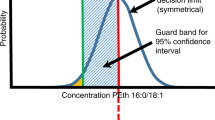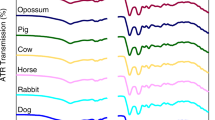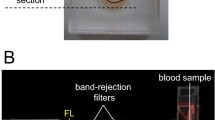Abstract
THERE has long been a need for a rapid standard method for the determination of levels of circulating organic compounds foreign to the blood stream. The inability to measure efficiently the blood and urine levels of compounds handled in industrial processes has hindered toxicological research and made adequate control of the working environment more difficult. The physician when establishing a diagnosis of an acute or chronic poisoning from an industrial chemical has had no ready procedure by which to identify the specific compound or to determine its concentration in the blood stream. The infra-red method to be presented satisfies the above implied criteria for an efficient analytical procedure: simplicity, rapidity, sensitivity, and availability.
This is a preview of subscription content, access via your institution
Access options
Subscribe to this journal
Receive 51 print issues and online access
$199.00 per year
only $3.90 per issue
Buy this article
- Purchase on Springer Link
- Instant access to full article PDF
Prices may be subject to local taxes which are calculated during checkout
Similar content being viewed by others
References
Herscher, L. W., Ruhl, H. D., and Wright, N., J. Opt. Soc. Amer., 48, 36 (1958).
Author information
Authors and Affiliations
Rights and permissions
About this article
Cite this article
STEWART, R., ERLEY, D., TORKELSON, T. et al. Post-Exposure Analysis of Organic Compounds in the Blood by a Rapid Infra-Red Technique. Nature 184, 192–193 (1959). https://doi.org/10.1038/184192a0
Issue Date:
DOI: https://doi.org/10.1038/184192a0
This article is cited by
-
Die Infrarot-Spektroskopie in der Biochemie und klinischen Chemie
Fresenius' Zeitschrift für analytische Chemie (1968)
-
Determination of Volatile Anæsthetics in Rhesus Monkey Tissue
Nature (1962)
-
Rapid Infra-Red Determination of Acetone in the Blood and the Exhaled Air of Diabetic Patients
Nature (1961)
Comments
By submitting a comment you agree to abide by our Terms and Community Guidelines. If you find something abusive or that does not comply with our terms or guidelines please flag it as inappropriate.



